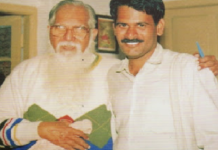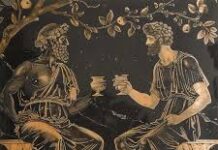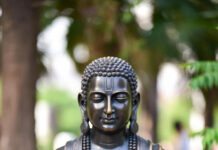
A few years ago, I was speaking with a person next to me in a bus. He complained that the legislative member elected from his constituency was a criminal by profession. He was involved in several criminal cases. He was settling disputes by force outside of the law. He was well known for forgery in land and property cases. My fellow traveller even said he had witnessed him getting ready for a fist fight in a dispute between him and another person. I asked him, ‘Doesn’t this mean that the majority of his constituents are criminals like him?’. He asked angrily ‘How can we say that? He has been elected by thousands of womenfolk. They will never commit a criminal act in their lives. They would not even mentally acquiesce to such an act.’
In general, the Tamil society by nature is against any sort of crime. A senior police officer in my acquaintance once told me that India has the least ratio of police to population in the entire world. Almost 30,000:1, he said.
But considering the population, the density in which the population lives and the various caste-ethnic divisions he said that the number of crimes that occur here are very less. I asked him what the reason could be. He replied ‘Crime is not controlled by the fear of policemen here. The people naturally have a repulsion for criminal acts. There is huge societal ostracization against those who steal and murder. He cannot stay with his family any longer. He cannot mix with his relatives and friends. He has enter the world of other criminals like him. Only within there will his friendships and relationships happen henceforth.’
‘One only needs to show such a world to new criminal to easily catch them. Here, criminals live as a separate society. Hence it is easy to monitor them. That is the reason why criminal investigation happens so easily here.’, he said.
A society that rejects its criminals thus forcibly, why does it elect hardened criminals as its representatives?
My fellow passenger said ‘What can we do sir? They are the ones nominated for our constituency by their parties. If we want somebody we like to win as the chief minister at the state level, we have to vote for people like him. Otherwise, somebody we dislike will end up as the chief minister. We vote for such criminals since we do not have a choice.’
Ok, why do these political parties nominate such criminals? The first reason is that criminals have the proceeds from the crimes they have committed. They have an organizational setup having selected other criminals like themselves. In case of need, they have the ability to organize a riot or a hartal. This is the second reason. Lastly, they have the ability to indulge in corruption without any hindrance from conscience and pay tributes to the high command.
Hence, in order to create a change of governance at the center or the state, we are voting for criminals without a choice. Whenever a criminal wins elections, it becomes impossible for the honest to continue in politics. This is because a honest person will find it very difficult to face a criminal in the political arena – he might even have to take to crime.
A criminal’s victory emboldens more of his tribe. They feel that their victory is not impossible too. They plan to hide their crimes better once politics and authority come in to their hands. In the beginning, it was only in UP and Bihar that most of the elected representatives came from a criminal background. After that, this trend has strengthened throughout India. Today, Tamilnadu has become as much a sanctuary for criminals as UP or Bihar.
What is sorely needed is the sense that at no cost should a criminal get elected in our politics. Even if it means that our vote will go waste, even if it means that somebody whom we liked will not come to power, we should resolve that at no cost should a criminal receive our vote.
Because we set a spectacularly bad example for our children by making a criminal succeed in politics. We destroy their faith in integrity and morals. At some instance, they will lose faith in us and our traditions.
That day, after alighting from the bus in Madurai, when I was speaking with a friend, he related how he had been betrayed by his own offspring. He possessed a significant piece of land and a huge house in his village. His four sons had migrated to different cities. They had planned to sell off the land and convert it into cash. But he wanted to live in the house of his forefathers till his last days. He had toiled hard to educate his sons and send them to the city.
But his children put pressure on him in several ways. At one point, they even said that they would not perform his funeral rites when he dies. But he was resolute in his refusal. They conspired together and forged his signature to sell off the house and the land without his knowledge. He came to know one day when the buyer came to evict him.
He didn’t want to file a case against his own children. He didn’t have the money or the clout to do that. Hence, he migrated to Madurai with his remaining savings to live with his wife in a small house. He burst into tears while narrating this story.
My mind instantly connected my fellow traveller’s conversation with this incident. We who elect persons who have no probity in public life into office and send them to legislative bodies, how can we expect our own children to behave with integrity and morals? We are the ones who created the example for our children to follow.
Do we not indirectly teach those children that trickery and injustice are the paths to success? Then how can we expect a righteous treatment from them?
At any cost, whatever party, religion or caste or background that he may belong to, we need the resolve that we shall never vote for a criminal. This is the promise we make for our children and our grandchildren. (2016)
Translated by Gogul












